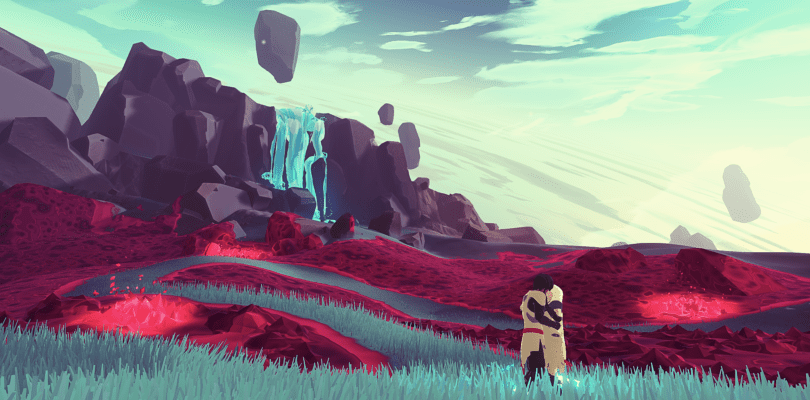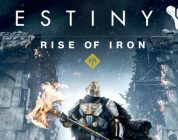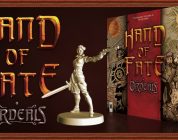Back in 2016, The Game Bakers made a bit of a splash in the gaming community with their visually stunning and fun to play hack and slash game Furi. Now they are getting ready to release their next title, Haven, and we wanted to learn more about this new project. This colorful and intriguing game Haven caught our attention at PAX West 2019 and merited our Best Indie award. Though its color palette and sci-fi setting takes a few cues from Furi, everything else seems to be thoroughly different, from the game’s mechanics to its story.
We were lucky enough to speak about Haven with Emeric Thoa, the game’s Creative Director and a co-founder of The Game Bakers. He seemed only too eager to answer our questions about this tantalizing title and share another glimpse behind the curtain.
The Interview
Note: At the bottom of the interview, you can also watch the game’s opening movie! Though having little to do with the gameplay, the animation is mesmerizing!
The tags on Indie Arcade say that this is a narrative driven game. Does that mean that player choices will effect the story or are you telling a more linear tale?
Emeric Thoa: You can really compare the narration to the Persona series. 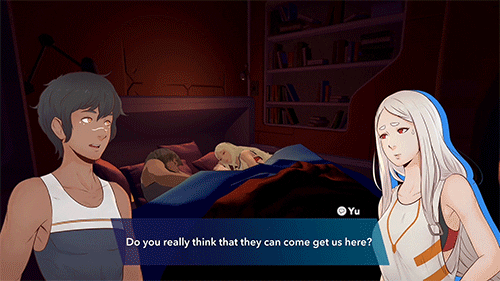 There is a general storyline that every player will enjoy, but depending on what you do in the game, you can get a dialog or a scene that is totally optional. It depends on the meals your two lovers have together, if you go to sleep often, if you sleep in the Nest (the spaceship) or outside, etc.. Within a dialog, there are also “choices” to make. These always have an impact on the current scene, but some choices also have an impact on the game ending.
There is a general storyline that every player will enjoy, but depending on what you do in the game, you can get a dialog or a scene that is totally optional. It depends on the meals your two lovers have together, if you go to sleep often, if you sleep in the Nest (the spaceship) or outside, etc.. Within a dialog, there are also “choices” to make. These always have an impact on the current scene, but some choices also have an impact on the game ending.
Are there any symbols, themes, or allegories that we as players and reviewers should be on the lookout for as the game progresses?
Emeric Thoa: Haha, this is one of the most interesting and twisted ways to ask for spoilers I’ve ever seen! Indeed, the game develops strong themes, but a lot of the pleasure is to discover them by yourself and a lot of effort on our side is put [in] to keep it subtle. One that I already openly talked about is that it’s a game about freedom, like Furi, but this time it’s the freedom of being with who you want. It’s also a game about love in an established relationship, about the intimacy of a couple, and how that is a different vision of love, compared to what we are used to in romcoms or JRPGs.
The game description says that the main characters “escaped” to this planet. Could you tell us more about what drove them here, or is that something we should wait to discover as the story unfolds?
Emeric Thoa: It’s really part of the story to understand what happened to them. I can say that they were not allowed to be together on their planet of origin, but they love each other so much that they were ready to leave everything behind to stay together. That’s one of the questions raised by the game: would you be ready to live with only one person for the rest of your life?
If the characters are in hiding and likely living on subsistence, why are they trying to “restore the planet?”
Emeric Thoa: Well actually, they are not really trying to do that. Their motivation is always something else. They clean some parts of the planet because it’s helpful for them: to reach a new area, to gather food, to help a creature. But “restoring the planet” is not even a question as it would be too big of a job for two people. 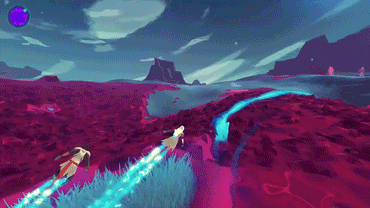
Is there a mechanical benefit to being good environmental custodians?
Emeric Thoa: Sometimes it’s narrative, sometimes it helps reach an area, it also always gives resources. But sometimes you can also do it just to be able to pet a creature afterwards.
Is there a risk that doing so and changing the planet will draw unwelcome attention?
Emeric Thoa: Drawing unwelcome attention is always possible, especially when you’re kinda goofy heroes like Yu and Kay.
The runaway lovers trope is seen across genres, so why settle with such an alien environment?
Emeric Thoa: You want me to tell you if that’s the same universe as Furi, do you? Well, I won’t tell you.
But nothing says it isn’t.
Why did you decide on a sci-fi setting for this story?
Emeric Thoa: I like sci-fi, or “cyberfantasy” as I call this kind of universe, because it’s both relatable and easy to work with in terms of game design. If I want to have gliding boots, I can. No need for a realistic justification. If I want an enemy to teleport, it’s believable. My characters have gauntlets that shoot blue energy? No problem. But I also find it more relatable to our modern world than, let’s say, heroic fantasy.
How does the narrative influence gameplay and mechanics, if at all?
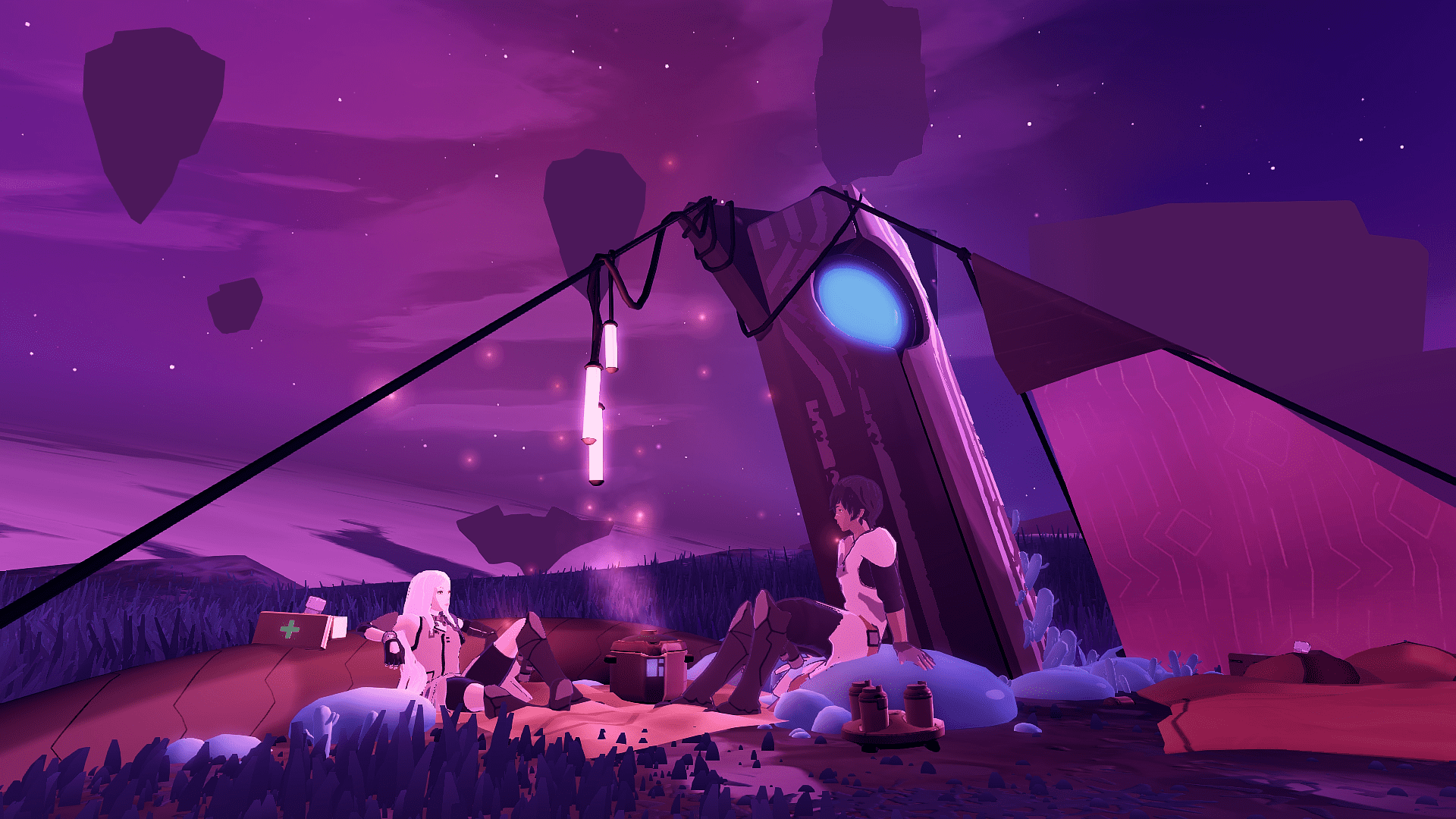 Emeric Thoa: It does a little, but saying how would be spoiling. One thing I can say is that leveling up is tied to the narrative. You gain “experience” (or build your relationship) through the moments spent together. The memorable moments and the daily routine equally. This gives much more XP than fighting a big foe for instance. Each time you have a narrative sequence about their life, the characters gain “XP.”
Emeric Thoa: It does a little, but saying how would be spoiling. One thing I can say is that leveling up is tied to the narrative. You gain “experience” (or build your relationship) through the moments spent together. The memorable moments and the daily routine equally. This gives much more XP than fighting a big foe for instance. Each time you have a narrative sequence about their life, the characters gain “XP.”
How does the [turn based?] combat mix with exploration and tackling entities, as seen in the trailer?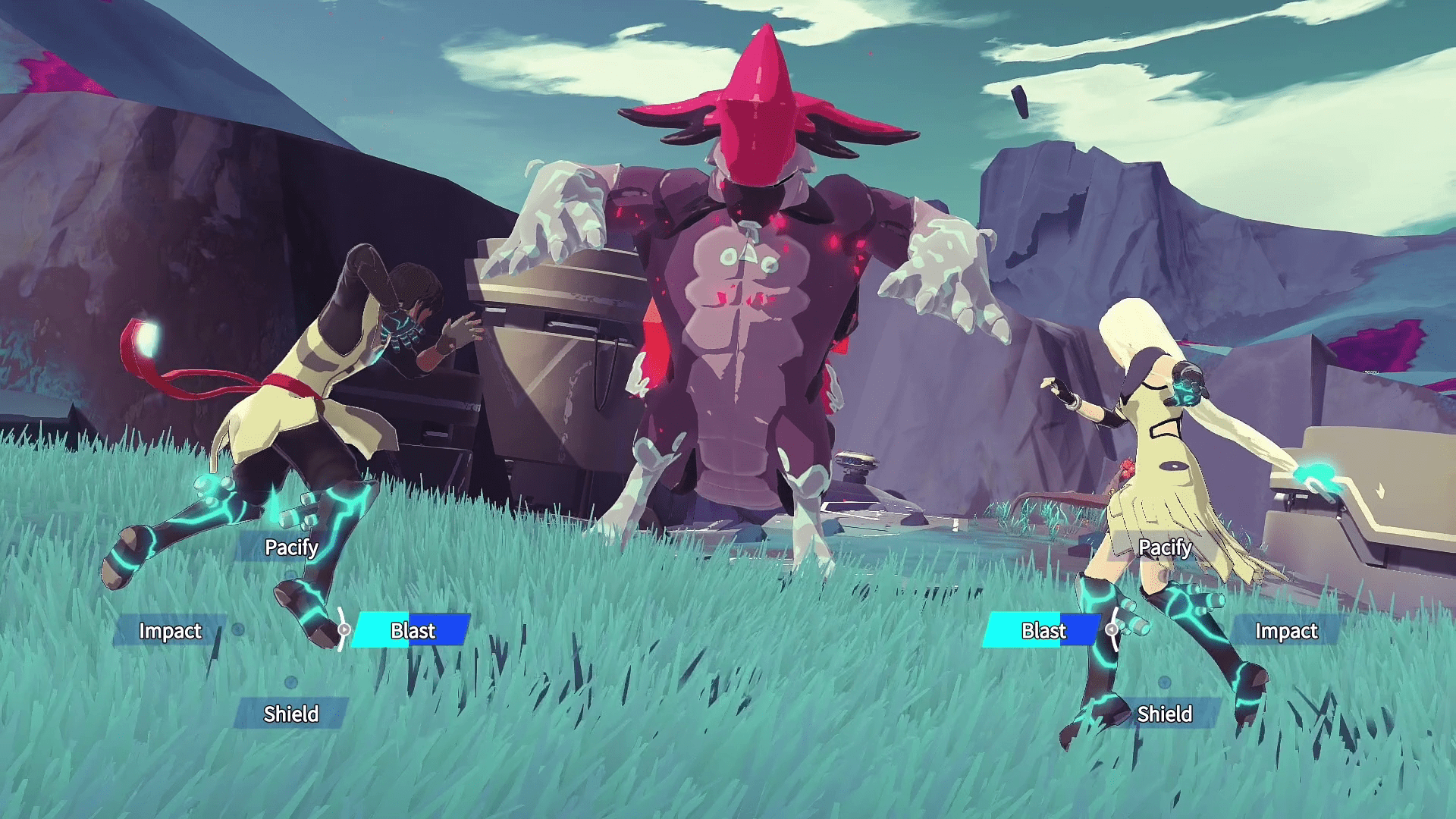
Emeric Thoa: Combat is not exactly turn-based. Time isn’t stopped in combat, and sometimes you need to react quickly to shield from an attack or chain a combo of hits. But again, it’s designed to be simple and satisfying. You can most of the time avoid combat if you want to, but combat also has value: it purifies creatures from the rust that makes them aggressive and hurts them, it gives a bit of resource[s], it reinforces your relationship, and it helps [with] cleaning the rust [off] of a floating islet, which has its own purpose.
Is there anything you want to draw our attention to?
Emeric Thoa: That’s nice of you to ask. Then I’ll take the opportunity to say that this game was on purpose designed to feel simple and relaxing; on the opposite end of [the spectrum from] complex RPGs or action games with lots of features and systems. Also, I want to emphasize that it’s possible to play co-op, but it’s absolutely not necessary. In both cases, the player plays “both characters.” It’s always the story of Yu and Kay.
Where could our readers find you on social media?
Emeric Thoa: Of course on our Twitter and Facebook and Youtube channel, but we also have a Discord channel, a newsletter, and we occasionally write some articles on our website (like this one for instance).

